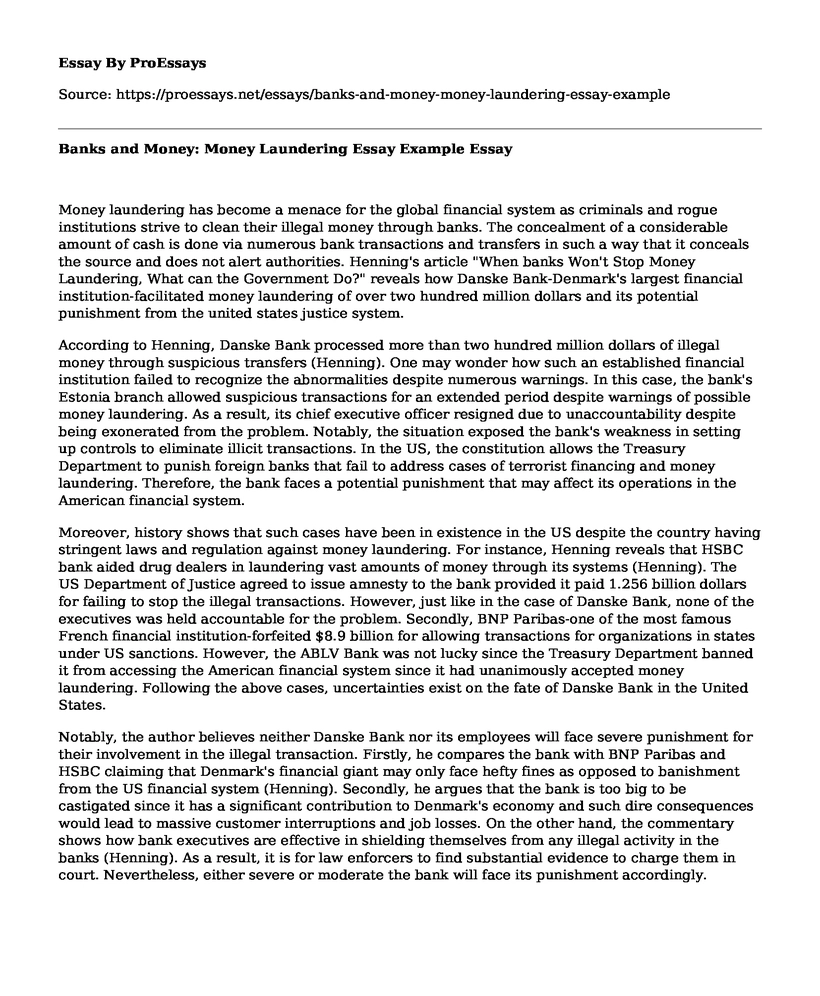Money laundering has become a menace for the global financial system as criminals and rogue institutions strive to clean their illegal money through banks. The concealment of a considerable amount of cash is done via numerous bank transactions and transfers in such a way that it conceals the source and does not alert authorities. Henning's article "When banks Won't Stop Money Laundering, What can the Government Do?" reveals how Danske Bank-Denmark's largest financial institution-facilitated money laundering of over two hundred million dollars and its potential punishment from the united states justice system.
According to Henning, Danske Bank processed more than two hundred million dollars of illegal money through suspicious transfers (Henning). One may wonder how such an established financial institution failed to recognize the abnormalities despite numerous warnings. In this case, the bank's Estonia branch allowed suspicious transactions for an extended period despite warnings of possible money laundering. As a result, its chief executive officer resigned due to unaccountability despite being exonerated from the problem. Notably, the situation exposed the bank's weakness in setting up controls to eliminate illicit transactions. In the US, the constitution allows the Treasury Department to punish foreign banks that fail to address cases of terrorist financing and money laundering. Therefore, the bank faces a potential punishment that may affect its operations in the American financial system.
Moreover, history shows that such cases have been in existence in the US despite the country having stringent laws and regulation against money laundering. For instance, Henning reveals that HSBC bank aided drug dealers in laundering vast amounts of money through its systems (Henning). The US Department of Justice agreed to issue amnesty to the bank provided it paid 1.256 billion dollars for failing to stop the illegal transactions. However, just like in the case of Danske Bank, none of the executives was held accountable for the problem. Secondly, BNP Paribas-one of the most famous French financial institution-forfeited $8.9 billion for allowing transactions for organizations in states under US sanctions. However, the ABLV Bank was not lucky since the Treasury Department banned it from accessing the American financial system since it had unanimously accepted money laundering. Following the above cases, uncertainties exist on the fate of Danske Bank in the United States.
Notably, the author believes neither Danske Bank nor its employees will face severe punishment for their involvement in the illegal transaction. Firstly, he compares the bank with BNP Paribas and HSBC claiming that Denmark's financial giant may only face hefty fines as opposed to banishment from the US financial system (Henning). Secondly, he argues that the bank is too big to be castigated since it has a significant contribution to Denmark's economy and such dire consequences would lead to massive customer interruptions and job losses. On the other hand, the commentary shows how bank executives are effective in shielding themselves from any illegal activity in the banks (Henning). As a result, it is for law enforcers to find substantial evidence to charge them in court. Nevertheless, either severe or moderate the bank will face its punishment accordingly.
Conclusion
Overall, money laundering is a persistent issue that facilitates illegal activities without alerting authorities. Banks such as Danske, HSBC, BNP Paribas, and ABLV are among rogue financial institutions that have allowed criminals to clean their money secretly (Henning). Issuance of hefty fines, as opposed to total punishment, may overcome an institution's willingness to comply with regulations since clients are inclined to give any amount to launder their money. Laws should be enforced to punish the individuals and banks that conduct this illegal act. The government must also discipline individuals that accept bribes from these criminals.
Work Cited
Henning, Peter. When Banks Won't Stop Money Laundering, What can the Government Do? The New York Times, 25 Sept. 2018, www.nytimes.com/2018/09/25/business/dealbook/danske-bank-money-laundering.html. Accessed 11 March 2019.
Cite this page
Banks and Money: Money Laundering Essay Example. (2022, Dec 10). Retrieved from https://proessays.net/essays/banks-and-money-money-laundering-essay-example
If you are the original author of this essay and no longer wish to have it published on the ProEssays website, please click below to request its removal:
- Operating (EBIT) Margin Research
- Compare and Contrast Essay on Hedge Funds and Mutual Funds
- Neural Network Application in Insurance Industry Essay Example
- Never Wanting to be a Prison Officer: The Dangers Involved
- Essay Example on Agriculture: Key to Turkey's Food Security and Economic Stability
- Free Essay Example on Witness Protocols & Evidence for Crime Scene Investigators
- U.S. Constitution: Separation of Powers, Checks and Balances - Essay Sample







